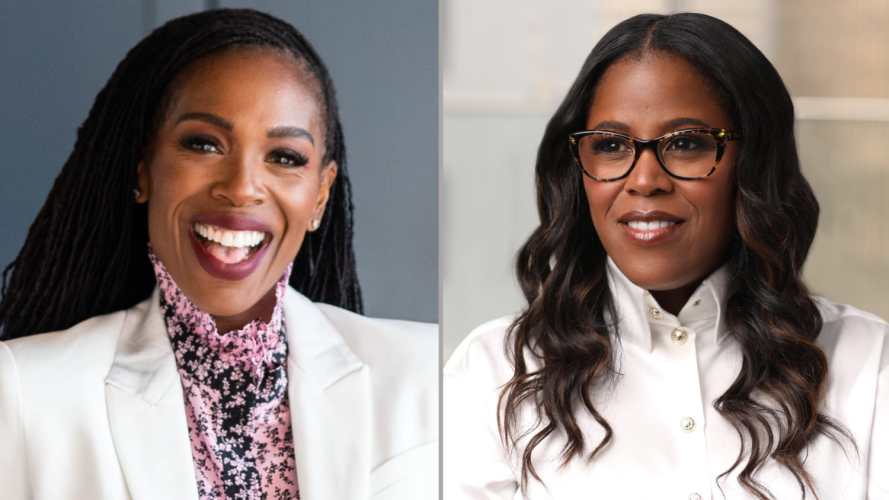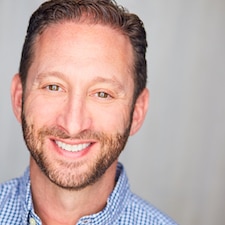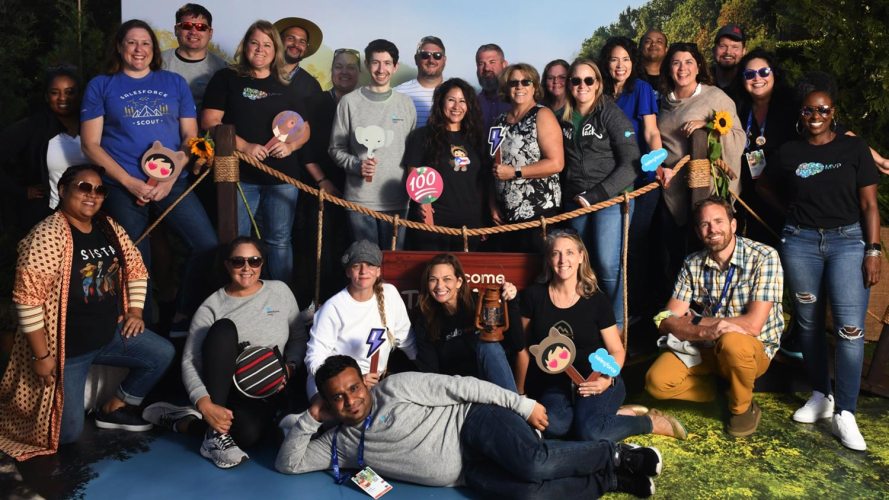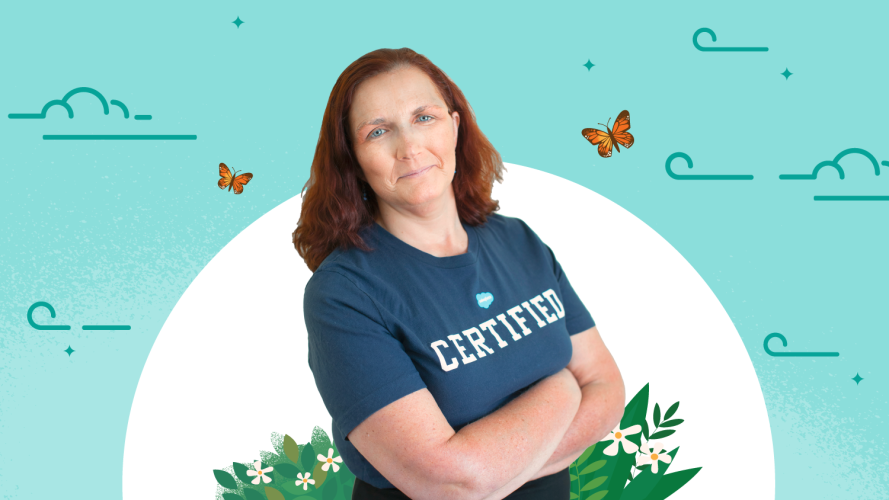Learn To Let Go of Perfectionism With TIAA CEO Thasunda Brown Duckett



Understand how to appreciate your worth with Salesforce’s Chief Philanthropy Officer Ebony Beckwith and TIAA CEO Thasunda Brown Duckett on the #BossTalks series, aimed at career-oriented professionals on LinkedIn.

Ari Bendersky
Who hasn’t heard that little voice nagging us to do better, push harder, achieve more? Oftentimes, this perfectionism is ingrained in us from our parents telling us to get ahead. We feel like if we’re not doing better than others, we aren’t doing enough. At all.
On the fourth episode of #BossTalks, Salesforce Chief Philanthropy Office Ebony Beckwith invited TIAA CEO Thasunda Brown Duckett to discuss letting go of perfectionism. They discuss what it was like being raised by parents who pushed them to work beyond their best abilities, what it means to allow yourself the space to be good enough, and other topics, including:
- Be so good you can’t be denied
- I am enough. I have enough. I do enough
- Mentorship is all around you
- Intention separates feedback and criticism
- Lessons for her children
Pop down to see the full transcript and the full episode.
Be so good you can’t be denied
Brown Duckett grew up in Rochester, N.Y., before her family piled into one car with all their belongings and moved to Texas. She says she knew what it felt like to “start life at the bottom” and that her parents taught her the importance of doing everything from a point of excellence, or not doing it at all. She also refers to this as Black excellence — the idea of understanding what you’re up against in the world.
“For me, knowing I had to be so good, I couldn’t be denied,” she said. “That comes with a lot of pressure. We’re second guessing ourselves. We’re saying, ‘I could make it a little bit better,’ versus saying, ‘I’m at a place where I produced the best I could produce at this moment,’ and putting that pen or pencil down. I think that comes from a really deep place of understanding what it means to have Black excellence, but also the pressure that it puts on ourselves when we are not ascending …. and I think that’s where it can become counterproductive in our own confidence building.”
Create high-performing teams
Create a culture of courage where everyone on your team can speak their mind and succeed using Salesforce’s online learning platform.



I am enough. I have enough. I do enough
During the conversation, Beckwith shared a mantra she received from a mentor that said, “I am enough. I have enough. I do enough.” It’s a poignant reminder for people when they start doubting themselves or keep pushing themselves to do more. Brown Duckett said people also need to remember they got a spot in the room in the first place because they deserve to be there — and no matter how hard we try to perfect things, more work will always be in front of us. And that’s OK.
“If you are striving for perfection, that’s okay, you’re striving,” Brown Duckett said. “Realizing the job is never done and perfection is never ever attained — but the pursuit of always trying to be the best version of yourself is where you really want to be. But not ever settling on saying perfection is the destination because, in fact, if you ever believe you’ve reached that level of perfection, you probably have marginalized or lowered your standards.”
Mentorship is all around you
People often forget, in order to succeed, you usually can’t go it alone. We need to rely on others for advice, to serve as a sounding board, to give us feedback and criticism. These people don’t have to be a boss or someone higher up. Brown Duckett says she learns from her executive assistant all the time. You just have to be open to hearing from people in all facets of your life.
“Mentorship is all around me,” she said. “My executive assistant mentors me because she shows me the ability to put someone before myself in how she presents herself. The person who delivers your coffee with that smile every day is mentoring you, reminding you about kindness.”
Brown Duckett says because she comes from a sports background, she learned to rely on a coach. She says coaches now emerge in different places and for different reasons. Someone might coach her on being a mother. Or wife. Or an executive, a dreamer — or even being vulnerable.
“The goal is not to rely on rented titles for your mentorship,” she reminds, “but to rely on the character within individuals that connect you to what you need developed or help with. I rent my title; I own my character. If we all operate in that space, knowing that titles are rented, you give yourself a breath.”
Intention separates feedback and criticism
Whether we want to hear it, we all need feedback and can’t escape it. Without an outside perspective on how we operate in business, or life in general, we can’t grow. But how it’s presented, Brown Duckett says, is how we can best receive it. She says feedback is a gift, but sometimes it’s one you don’t want. Conversely, criticism may come with an ulterior motive.
“The difference between feedback and criticism for me is anchored on intention,” she said. “If someone is giving me feedback, I receive it better than criticism. Feedback for me says: this person wants me to be better. Criticism, I may not know where your intention is lying. Are you critiquing me to make me feel small in order for you to feel big? Are you critiquing me because you just haven’t learned how to articulate it in a way that I can receive it? The point is, we should be open to receiving what people have to say, but you have to calibrate that in your own prism.”
Lessons for her children
Like any parent, Brown Duckett wants the best for her children. While she was raised with the push to be excellent, she doesn’t exactly want to put that pressure on her children. Of course, she wants them to excel, but more than anything, she wants them to feel affirmed. It’s a great life lesson and a good reminder to rely on those closest to you for affirmation since we may not get that at work all the time.
“I am a huge believer in teaching my children the only job they really have is to be the best version of themselves,” Brown Duckett said. “I think it’s really important when you are this mom that is ascending, I’m trying to be the best version. I never want my excellence to be the thing my children feel they cannot be. Therefore it’s a negative in their own psyche. So I am reminding my children to be the best version of themselves, anchored in character.”
Watch #BossTalks Live
Sign up for the next episode to hear Salesforce Chief Engagement Officer, Cristina Jones, talk with Ebony about how to find your voice.



Watch the full episode and read the full transcript with viewer questions.
Ebony Beckwith:
Hello, everyone. And welcome to Boss Talks; a new series, featuring candid career conversations with people I admire and trust to keep it real today. We’re talking about something I can totally relate to, and that’s letting go of perfectionism. I know there was a point in my career when I thought it was a good thing to try and do everything perfectly. But in reality, the fear of making mistakes is what was holding me back from going after new career opportunities and really being my authentic self. I’ve often referred to myself as a recovering perfectionist, because I’ve definitely had to learn how to ask for help and bounce back after making mistakes. But I’ve come to realize that this process of moving away from perfectionism is actually a sign of growth for me. And that’s the framing I want to take into today’s conversation.
I couldn’t be more excited to welcome someone I personally have a career crush on, the brand new CEO of TIAA and the former CEO of Chase Consumer Banking, Thasunda Brown Duckett. Thasunda, welcome to Boss Talks. I am so thrilled to have you here with us today
Thasunda Brown Duckett:
Thank you so much, Ebony. I feel the exact same way.
Ebony Beckwith:
Today’s episode is all about letting go of perfectionism, which I shared as something that I personally had to learn. And sometimes the hard way. Thasunda, you make it look so easy, but I know there’s so much more to someone’s journey to success than what we think we know or see on the surface. And that’s what I want to dig in today. So let’s jump in starting with the first question. So your career trajectory has been so inspiring to watch, and I’m sure there are a lot of people watching today who would join me in saying, we’ve been cheering you on from the sidelines. And you just took on another big role as CEO of TIAA, which for those of you who may not know, is a Fortune 100 provider of secure retirement and outcome focused investment solutions. So congratulations on that. Can you take us back to where it all started for you and what your journey has been to get there?
Thasunda Brown Duckett:
For me, the truth is I did not dream of becoming a CEO. That was not in my consideration set. I grew up in Rochester, New York, moved to New Jersey and we moved to Texas. And we moved with everything that we owned in a car, two siblings and myself, my mom and my dad and all of our belongings, which means there was not much. And so, I know what it’s like to literally start your life at the bottom. What my parents taught me, which I think is key to where I am today are my ownable assets. They taught me the importance of whatever you do, you do it with excellence or you don’t do it at all.
Ebony Beckwith:
I feel like we can’t have a talk about perfectionism without talking about the pressure of black excellence. I know for me, my mom was very intentional about how she raised me and insisted that I be excellent. For me, I know that I remember if there was so much as an eraser mark on my paper, she’d look at my homework and she’d say, do it again, do it again. And sometimes I had to create my own paper just to turn in my homework because she was like, it’s not excellent enough. It’s not good enough. You can do better. I laugh. And it’s a funny story now, but I’m grateful for it. Can you share about how this showed up for you or if it still shows up for you?
Thasunda Brown Duckett:
I think honestly, Ebony, I think what our parents were giving us was an understanding of what we’re up against. And I think for me, knowing that I had to be so good that I couldn’t be denied, if there was an opportunity where I was just as good or a little bit better and I did not get it, I didn’t beat myself up as much because I said, I wasn’t so good that I couldn’t be denied, but that comes with a lot of pressure.
And if we’re honest, I think this level of being a perfectionist is also at the intersection of confidence and lack thereof and insecurities and vulnerabilities because in our pursuit to be a perfectionist, we’re doing mental gymnastics in our head. We’re second guessing ourselves. We’re saying, I could make it a little bit better. I can make it a little bit better versus saying, I’m at a place where I produce the best that I could produce at this moment and putting that pen down or that pencil down. And I think that comes from a really deep place of understanding what it means to have black excellence, but also the pressure that it puts on ourselves when we are not ascending or when we don’t get that opportunity, we start to do those mental gymnastics. And I think that’s where it can become counterproductive in our own confidence building.
Ebony Beckwith:
That is so true. One of my mentors tells me to this day, she’ll remind me to tell myself I am enough. I have enough. I do enough. And that’s a mantra that I have to repeat because I have a hard time sometimes letting that go. But I love what you said about the mental gymnastics. So what advice can you offer for our audience when dealing with this perfectionism, especially women?
Thasunda Brown Duckett:
Yeah. The advice your mentor gave you is advice that I’d hold with me as well that I am enough. I think reminding ourselves that we are worthy and deserving to be in the room. And also reminding ourselves that the reality is to get to the room, we were not perfect. The reality is we went through a lot of ups and downs, whether it’s our own, how we were raised, narrative or whether it was those moments where you had to overcome your confident, your lack of confidence or insecurity. And so I think sometimes reminding ourselves that that excellence lies within those levels of not being perfect.
And in fact, if you are striving for perfection, that’s okay, you’re striving. But realizing that the job is never done and perfection is never ever attained, but the pursuit of always trying to be the best version of yourself is where you really want to be. But not ever settling on saying perfection is the destination, because in fact, if you ever believe you’ve reached that level of perfection, you probably have marginalized or lowered your standards.
Ebony Beckwith:
So let’s transition. So that mentality that we had when we were younger of needing to do things perfectly or not at all, that definitely for me, crept into both my personal and professional life. And this was really especially apparent for me when I needed to ask for help. And that was something I had to actually learn. But when I did, it really opened up my capacity for leadership, because I was able to collaborate and also consider new ideas. Can you talk about just your process for asking for help? Did you have to learn to do that? Did that come naturally for you and how did you use maybe your mentors for that?
Thasunda Brown Duckett:
Yeah. I come from a sports background and I think my mindset is understanding that in order for me to be excellent, I need a coach. And how I define a coach in the sense of mentorship means that mentorship is all around me, I just have to have an openness and a willingness to receive it. And so let me tell you what that means for me, Ebony. My executive assistant mentors me because she shows me the ability to put someone before self in how she presents herself. The person who delivers your coffee with that smile every day is mentoring you, reminding you about kindness.
And so, I just think that when we define mentorship, sometimes we narrow that definition and we look for one person to be all things for us. And the reality is there’s so much that makes me, me and you, you, which means I may need a mentor for the examples I just raised or a mentor on how to navigate motherhood or being a wife or being an executive or being vulnerable or being a dreamer. And so I think the goal is not to rely on rented titles for your mentorship, but rely on the character within individuals that connect to what you need development or reminding or help with, I think is the most important thing.
Ebony Beckwith:
Ooh, I hope you all are getting this. So mentorship can come from anywhere. It’s about that character, the qualities that we’re looking for, not the title. I think that’s huge.
Thasunda Brown Duckett:
Absolutely. I like to say, Ebony, I rent my title, I own my character. And I just… honestly, and I think if we all operate in that space, knowing that titles are rented, you give yourself a breath.
Ebony Beckwith:
So Thasunda, I’m a big believer in taking risks. And I recently wrote something on Boss Notes, encouraging people to try something new, even if it means you might not get it 100%, right all the time. And a few people wrote me to say that they wanted to take more risks, but they fear the criticism that comes from making a mistake. So how do you think about taking risk at work? And also, do you have any guidance on how to bounce back if you’ve made a mistake?
Thasunda Brown Duckett:
First, let’s just remember we can’t escape criticism, just my being can invite criticism. And so I think if we think of criticism in the context that there is nothing that you do or do not do that will exempt you from criticism is step one. I think step two is knowing that it’s okay to be vulnerable. It’s okay to invite feedback in. No one wants to hear it, but we all need it. But what I would encourage everyone to think about is what are your hopes and your dreams? What are you really trying to accomplish? And in the pursuit of making and attaining those goals, there will be risks that we have to take. And even if we fall down, you never know that in that risk may be where that real unlock, that real opportunity or learning if nothing else resides. And I think that’s just so important. Risk is difficult. We all want to stay in that safe space sometimes, but to be the best version of you to unlock your talent, you will be taking risks.
Ebony Beckwith:
That’s right. Well, I want to go back to something you said about feedback and criticism. So you don’t see those as the same thing. So I look at feedback as a gift, giving it and receiving it. So tell me how you’ve learned how to… If you think of feedback, some people think of feedback as criticism, so how did you learn how to try to change that for yourself?
Thasunda Brown Duckett:
Well, listen, feedback is a gift, but sometimes it feels like a gift you don’t want. If I’m being honest, feedback is a gift, but sometimes you’re hesitant to hear it. But the difference between feedback and criticism for me is anchored on intention. If someone is giving me feedback, I receive it better than criticism, because I think feedback for me at least says, this person wants me to be better. This person is giving me a true gift. This person is helping me with my blind spots. This person is on my team. Criticism, I may not know where your intention is lying. Are you critiquing me to make me feel small in order for you to feel big? Are you critiquing me because you just haven’t learned how to articulate it in a way that I can receive it or feedback.
And so, I just think feedback is important. Criticism, you have to sometimes navigate. But here’s the most important thing, Ebony, whether it’s criticism or feedback, because sometimes the receiver we can mix it up.
Ebony Beckwith:
Right.
Thasunda Brown Duckett:
The point is, we should be open to receiving what people have to say, but you have to calibrate that in your own prism. And you have to say, I am open and receiving the feedback in the critique, but then I am the CEO of Thasunda. And therefore, I have to process everything that people have said. And I either say exactly the way in which you shared it with me is the way I will receive it, or I will say the way in which you said it, I would modify it, but I can receive it. Or I will say return to sender.
But I think it’s important because sometimes criticism or feedback may not be exactly the point of what you’re trying to solve for, it’s someone expressing their thoughts and you have a responsibility to process it in a way that you can decide, how is this going to make me better? And sometimes there’s feedback that you will receive that you will disagree with. And that’s okay, but the trick is to always be open to receiving it and have gratitude for what people are willing to share even if it’s not always positive.
Ebony Beckwith:
You just said something that I want to take us back to because it’s something we talk a lot about. And I know I talk about this personally. I have this concept of, I have team E and I am the CEO of team E, and I have a personal board of directors at all levels of my life. But it’s ultimately, I have to make the decision. So whether it’s accepting feedback or criticism or whatever it is, advice, guidance, I have to internalize that and make sure it works for me because people have all kinds of advice, suggestions for you. So do you feel the same way and who’s in your team?
Thasunda Brown Duckett:
Wow. First, I do feel the same way. I am the president, the CEO of Thasunda, but I realize in order to be the best, I need to have those truth tellers around me. And I need to make sure that I am the biggest truth teller of myself. And I think that’s important too. But who’s around me, Oh my goodness. First of all, you have your core board, the ones who really understand who I am at my core, and that’s that sisterhood for me, in some brothers and the brotherhood, but my network, that know the essence of who I am. And therefore, they may not be on the board to help me think through complex issues, but they are my board reminding me who I am and what I’m here to do. And then you have your other boards. You have your boards when you are working through those complex issues or when you are, as we are Ebony, senior executives and that loneliness that comes with it and being able to connect with people that really understand what that means and how to navigate through it.
So I think that for me, I create boards that really, really embody all the aspects of who I am because not one board can be the best board for all aspects of me. And I just think you can’t put that pressure on your one board because you will not be able to get the best advice, you have to give yourself permission to say, what am I trying to tap into and who are the best people that I trust that can give me that? And it could be my children. It could be my spouse. It could be my girlfriends. It could be my guy friends. It could be people at work or it could be even the people that I mentor because there’s a lot to me and I need that coach and that feedback from a host of different people.
Ebony Beckwith:
That’s right. I know there are a lot of parents in the audience, so I just want to take a moment as we started off kind of talking about our parents and what we learned and that feeling of black excellence. So I’d love to know just what are you teaching your kids right now that you hope that they take with them into adulthood? Or is there anything you’re teaching them with regard to fighting that urge towards perfectionism that you can share with other parents who are building these mini bosses?
Thasunda Brown Duckett:
Right. Well, I would start with affirmations. If you ask my children who they are, they will say that they are smart, kind and brave. And that’s from my five-year-old all the way up, because I think reaffirming what you want from your children is most important thing.
Ebony Beckwith:
That’s right.
Thasunda Brown Duckett:
I would also say that I am a huge believer in teaching my children that the only job they really have is to be the best version of themselves. And I think it’s really important when you are this mom that is ascending and who’s trying to be the best version of herself, which is me. I’m trying to be the best version. And I never want my excellence to be the thing that my children feel they cannot be. And therefore it’s a negative in their own psyche. And so I am reminding my children to be the best version of themselves, anchored in character [inaudible 00:18:35].
Ebony Beckwith:
And it’s so important, especially as we think about the next generation coming up, there’s so much that they’re dealing with, like you said, that we never had to deal with. So yeah, while we’ve been 12, we’ve been five. We’ve never been five in 2021. So it’s difficult.
Thasunda Brown Duckett:
Correct.
Ebony Beckwith:
So Thasunda, final question, I’m asking everyone what their superpower is, and I’m going to make it a little harder for you and ask you for your superpower and your advice for those who haven’t been able to yet identify what their personal superpower is.
Thasunda Brown Duckett:
First, my superpower resides in my ownable assets. My superpower is where my passion lies, which is to inspire. And that shows up through my ability in quest to connect with others and through always understanding the power of community. And so what I would say to those who are saying, I don’t know my superpower, or I don’t know my purpose. Let’s break it all the way down. And I start with letting everyone know that you are extraordinary. And if I play back these words, it will connect to you. Extraordinary is kindness. Are you kind? That can be your superpower. Extraordinary is intellectual curiosity. Are you curious? Extraordinary is giving. All of those adjectives that define who you are, is your superpower. The only question we have to ask ourselves is what aspect of that are you going to unlock and unleash? And the unleash is where your superpower lies.
Ebony Beckwith:
That was so inspiring. Thasunda, I want to thank you for giving us an inside look into the life of a real boss. This has been such a treat for me and for everyone watching at home. So I just want to say, thank you so much for being here and sharing your authentic self with us.
Thasunda Brown Duckett:
Thank you, Ebony. It was a pleasure.
Ebony Beckwith:
And now I to hear what you have to say, so let’s hear your questions.
Jeremy:
Hey, Ebony. Do you know the saying, don’t let perfect be the enemy of good? I find it hard to share things that are a work in progress because I’m afraid it’ll reflect poorly on me. What’s your advice for getting over this?
Ebony Beckwith:
Hi, Jeremy. Great question. And it sounds like you already know that perfectionism is getting in the way of collaboration, which is so essential in getting the best possible product. So my advice for sharing your work early is to do it with some boundaries. For example, let your team know that you’re working on something that’s not finished or give them specific instructions for how and where to plug in, be explicit and say how you’d like the feedback here, but not there or ask support for figuring out X, but that you’ve got Y covered. I find that people are often eager to help. They just don’t always know how to be the most helpful, and they can get pretty overwhelming unless you offer some direction. So try setting up some boundaries the next time you share your work so that you can gain that helpful input and perspective of your team without feeling bombarded.
I just want to thank you all for sending us your questions. I will definitely include some each episode. So please add your questions in the comments on our LinkedIn page, or send me a tweet @EbonyBeckwith using hashtag #BossTalks. I hope you all enjoyed today’s conversation on perfectionism. To continue building valuable skills for your career, head on over to Trailhead. Salesforce is free online learning platform that helps anyone skill up for in-demand jobs in the Salesforce ecosystem. With that, I’m Ebony Beckwith. Thank you for tuning into Boss Talks.
























